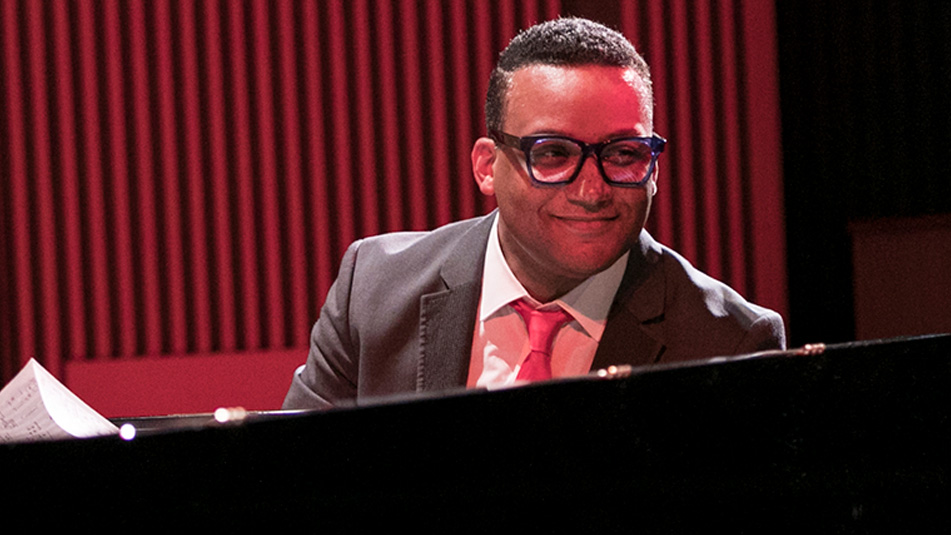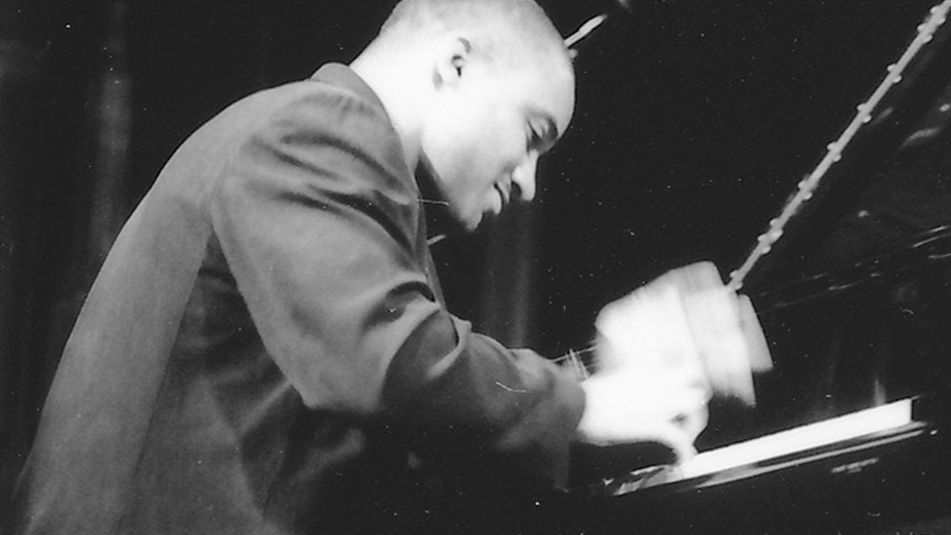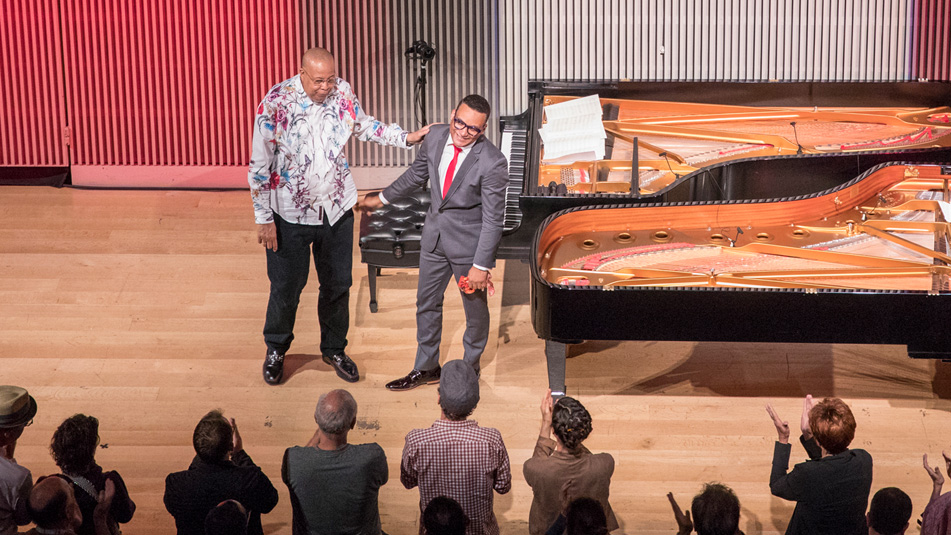Gonzalo Rubalcaba Discusses Chucho Valdés, creativity, and the SFJAZZ Lifetime Achievement Award
January 24, 2019 | by Richard Scheinin

Gonzalo Rubalcaba performing at SFJAZZ (duo with Chucho Valdés) in August, 2018. Photo by Scott Chernis.
Last year was a good one for aficionados of Cuban piano music: Chucho Valdés and Gonzalo Rubalcaba toured internationally. Given that these two maestros stand at the forefront of the Cuban pianistíca tradition, this was quite an event. Last August, they brought their show to SFJAZZ for four nights – and now Valdés is to be honored by SFJAZZ with its 2019 Lifetime Achievement Award. He will perform with special guests at the organization’s Jan. 31 Gala and for three more nights (Feb. 1-3) with his band Irakere 45.
We decided to talk to Rubalcaba about Valdés’s contributions to Afro-Cuban music and jazz – and about the fact that he, too, has been honored by SFJAZZ for his musical contributions. (That was in 2001, when Rubalcaba won the Leaders Circle Award, forerunner to the Lifetime Achievement Award.)
A virtuoso conversationalist, Rubalcaba inevitably touched on many other subjects – the whole matter of musical lineage, as well as the challenge of passing on a tradition to the next generation. He talked about the responsibility of an artist to his or her audience, and even expressed concern that he might spread himself too thin by pursuing his burgeoning career as a classical pianist. At age 55, he is as motivated as ever. A series of Rubalcaba-led trio discs is on the way: Skyline, with bassist Ron Carter and drummer Jack DeJohnette, will be released in the next several months, to be followed by a recording with bassist Matt Brewer and drummer Eric Harland, and finally a “Latin fusion trio” date whose personnel is still in the works. “It’s a trilogy, three different trios with three different musical projections,” the pianist says. “ A lot of work, a lot of fun – and something that I had in mind to do for a long time.”

Gonzalo Rubalcaba performing in the San Francisco Jazz Festival at Herbst Theatre in 1997 – a double bill with his trio and fellow Cuban pianist Omar Sosa.
Like Valdés, Rubalcaba descends from a rich family tradition of music-making. His father, the pianist Guillermo Gonzalez Rubalcaba, played with Enrique Jorrin, the violinist credited with inventing the cha-cha-cha. His parents’ Havana living room was a musicians’ hangout and rehearsal space where he met many of the period’s eminent figures: vocalist Omara Portuondo, pianist Frank Emilio Flynn and Los Van Van drummer Changuito. By age 17, Rubalcaba was touring Europe with Orquesta Aragon, the venerable charanga band. In the mid-‘80s, when he was in his early 20s, Rubalcaba was championed by Dizzy Gillespie, Charlie Haden and other American jazz musicians. Within a few years, he was signed by Blue Note Records. He moved to the United States – he lives with his wife Maria near Fort Lauderdale, Fla. — and his career has never slowed.
We asked him to pause for an hour to talk about Chucho Valdés, and about his own life in music.
Q: What surprises you about Chucho Valdés? What did you discover about him during your duo tour?
A: I discovered in Chucho a childlike quality. It’s the thing that keeps him yearning and searching – the desire to keep on working and, above all, to do it with gusto. And he doesn’t seem to be afraid of any challenge that is presented to him. I think one could say that Chucho is still musically and personally “restless.” He is constantly listening to new things… He is current.
Q: When you were growing up in Havana, Chucho was already a revered musician. When you heard him on records or watched him on television, what stood out?
A: Those extraordinary technical skills, which perturbed so many of us pianists in and out of Cuba!
Q: Can you remember the very first time you heard about him?
A: My first recollection of the name “Chucho Valdés” was associated with the Orquesta Cubana de Musica Moderna (the Modern Music Orchestra), one of the most important groups of that era with an extraordinarily demanding approach to the compositional and arranging process. This group was a type of model or guide for those of us who were getting started in music, and Chucho was involved not only with the OCMM, but other ensembles as well, all of which were critical in merging the world of Cuban music and jazz vocabulary.
Q: What were your impressions of Chucho in the mid-‘70s when he founded Irakere?
A: I was entering my teen years… (Chucho) explored so many sonorities that as yet hadn’t been explored. It was through his orchestrations and his compositional vision in Irakere, as well as in other formats, that I had always seen him: blending the Afro-Cuban folk and popular traditions, creating an “embrace” between these traditions and jazz – and not only jazz, but classical music.

Q: Like Chucho, you also have been honored for your life in music. That was back in 2001. Can you remember how you felt about it?
A: I felt terrified! It was to me impossible. I was 38, maybe 39 years old, and it was clear that they had too much confidence in me. The only thing I can say is that there was a constant factor that was present at that time and is still part of me today and will be until the day I die, which is the love for music. This is probably what people at that time saw in me — a determination to do music as a way of living, not only to make my living, but a way to live.
Q: Besides feeling terrified, how else did you feel? Tony Bennett had already won the same award. So had the Modern Jazz Quartet and Charlie Haden.
A: It gave me air – it gave me air to breath strongly. It was an inspiration to believe in what I was doing, that I was on the right track and that I should continue to prepare myself musically every day, as if it were the first day. And with the years, to see the other names that they have included in this book of recognition – it made me feel very proud and very honored.
Q: When you reflect on your upbringing in Havana, and on all the musicians you knew as a boy, what stands out?
A: They were looking for a certain quality in music – for music that moves you in some way. I’m grateful to have lived in the middle of that, surrounded by those sounds and musicians and talks and discussions. Always, I learned about the essence of the Cuban music and the Afro-Cuban music and this connection between the folklore from Cuba and the rituals from Africa — all those elements, and it’s impossible at this point in my life to divorce myself from that experience. It’s not something that I get from books or from videos; I was right in the middle. It was part of my life. And at some age, at some moment, I realized that all my tools to make music came from this background, and that’s still the case. It’s sometimes evident, or sometimes hidden in the music, but that reference is in everything I do. Without those experiences, I would be a different musician and a different person.
Q: Do you talk about this with your students at the University of Miami – about drawing on their own experiences to make music?
A: Yes. I always say to the students, “Before you look ahead, you have to look back. It is important to be clear in where you’re coming from.” Because sometimes we’re looking too far ahead, always looking to catch some new sound, some new chord or rhythm – even though everything we need may already be around us, more than we believe it is. It’s nothing bad to look ahead. But sometimes we look too far to find our own selves. This is why I tell them, “Don’t forget what accompanied you since you were little kids. What music did you first hear? What music were you able to dance to with your first girlfriend or boyfriend?” In the end, the most important thing is the most difficult to get in life, which is the balance. We would like to be totally free and open to assimilate new sounds, new possibilities. But we must also remember that, at least in part, we are the product of what we have seen and heard in our lives.
Q: Your son Joao, is a music producer in Brooklyn. What do you learn from him?
A: He’s very interested in electronic music and the visual arts, and I brought him into the session with Ron Carter and Jack DeJohnette as part of the recording team. We plan maybe to release some of the video from the session, and Joao is doing the editing. He has a different eye. He sees and thinks differently from what I see. It’s complementary, and, at the end, it’s really rich – there’s something added to what I would normally see and hear in terms of the sounds and images. He’s really helping me.
Q: Your career as a classical pianist is growing alongside your jazz work. You’ve been commissioned to compose a concerto that you will perform in 2019, is that correct?
A: Yes, it’s commissioned by a symphony organization in Istanbul, Turkey. I started working on it about a year ago. But in the meantime, all these other ideas came up about playing classical music with symphony orchestras around Europe. I recently was in Zagreb, Croatia, to play Gershwin’s Concerto in F. I have been in love with this music for a long time. It contains everything. It contains virtuosity, but it’s much more than just a piece where you see the pianist showing off his skills. Each movement of the piece is a masterpiece of composition and arrangement for the orchestra – all the sounds, the harmony, the sequences, the feelings. It’s really marvelous.
Q: Will you be doing more of this
A: Well, I’m afraid, because after this concert in Zagreb, some European agents began talking seriously about my doing classical concerts during the whole year – a tour of classical music, and that’s a huge challenge to me. It’s not that I just say, “Oh yeah, I want to do it,” and that’s it. You have to be serious about it. You have to prepare yourself to play that music accurately. I’ve been playing so many types of music at the same time, and I don’t know if I’d be able to do it physically and mentally. To me, the most important thing is not the quantity of what you do, but the quality, the seriousness of what you bring to the people.
Q: What have you decided?
A: I’m thinking about it.
Q: Last year, you performed at a friend’s tiny venue in Japan – a room for only 20 or 30 people, designed for young parents to bring their babies and toddlers to a concert. What was it like?
A: They move around when you’re playing and many of them come closer to you, and closer to the instrument. They do that for a while, and they feel free to just stay there, just looking and trying to discover what it is you’re doing, and this is marvelous. It’s amazing. And even more than the grace and the sweetness I feel from them, I feel a tremendous responsibility to give them what they are looking for. I don’t know what it is, exactly. But wherever I play, I try to be more and more careful about what I’m saying, the music I choose, how I’m to prepare all of this. I want to be always at the level of what the people expect. I believe they expect something.”
